“The most loving parents and relatives commit murder with smiles on their faces. They force us to destroy the person we really are: a subtle kind of murder.”
— Oyinkan Braithwaite, My Sister, the Serial Killer
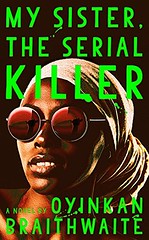 My Sister, the Serial Killer
My Sister, the Serial Killer
by Oyinkan Braithwaite
![]()
This is my book club’s selection for July 2020. I’m looking forward to the discussion on this one!
Those who have read “My Sister, the Serial Killer” will understand why I quote the entirety of one of the final chapters. Those who have yet to read it, I think, will like me find themselves referring back to it after finishing the book:
“Korede, he’s dead.”
“What?”
“He’s…”
“What the hell? What are you saying? He’s…you…you…”
She burst into tears. “Please. Please. Help me.”
When I picked up this book I assumed the title was allegorical. To my delight, the narrator’s sister really is a serial killer! And delight is the right word for this short novel about sisterhood and family, set in Lagos, Nigeria.
Oyinkan Braithwaite’s writing is straightforward and simple. The story she tells here is on its face equally straightforward and simple, but there are layers of meaning. The characters are convincingly real. I loved the depiction of upper-middle class life in Lagos, and the shocking (to an American reader) glimpses of Nigerian patriarchal culture. It’s a fast, intriguing, and rewarding read. I don’t know if other reviewers have mentioned it but it would make for a hell of a streaming TV mini-movie on Netflix or Amazon.
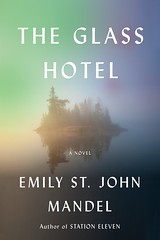 The Glass Hotel
The Glass Hotel
by Emily St. John Mandel
![]()
In “The Glass Hotel,” characters’ lives intertwine and influence one another in fascinating ways, reminding me a bit of the novels by Stuart Archer Cohen and William Gibson. I was fascinated from beginning to end; it is a most enjoyable and interesting read. I always find it hard to say much about books I love; this one is no exception.
My library classified this book as a mystery; I kept scratching my head over that. It’s straight fiction, and although there are some alternate reality/ghost story themes in the final chapters, these are no more than the kind of daydreaming speculations we all indulge in when we think about the mistakes we’ve made and the people we’ve wronged: what if I had done this, what if I had done that.
All of the characters felt real and alive to me, from the self-possessed Vincent to the worthless wastrel Paul (can you tell I have little patience with addicts?).
I love the way Emily St. John Mandel writes. I loved “The Glass Hotel.”
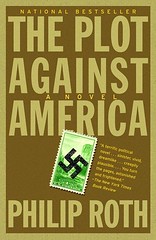 The Plot Against America
The Plot Against America
by Philip Roth
![]()
I first read “The Plot Against America” shortly after it was published in 2004. I decided to read it again after watching HBO’s excellent TV adaptation.
I can’t say this novel is Roth’s best work (parts of it are quite windy), but it’s certainly among his most affecting. Roth made it easy to relate to the Levins, and particularly to the two boys, Sandy and Philip. Roth made it easy to accept the idea that Lindbergh could have swept into office in 1940 by running on an anti-war platform.
I grew up in the 1950s, a time when Lindbergh was still a hero to white Christian schoolchildren. Our parents and teachers never talked about Lindbergh’s anti-Semitism or his work for the America First Committee, any more than they talked about Japanese-American concentration camps. Lindbergh was even more America’s hero in the 1930s and 40s, the time the novel is set in, and until Philip and Sandy’s Jewish parents and neighbors turned against Lindbergh, had been a hero to them as well.
The TV adaptation added an interesting twist involving the ne’er-do-well nephew Alvin, a twist not present in Roth’s novel. Did it make for a better story? On the whole, I think it did. Roth wrote Lindbergh away by having him fly off and vanish, never to be seen again, then proffered a few outlandish conspiracy theories to explain the wave of anti-Semitic attacks that swept the country afterward. In the TV adaptation, Alvin is recruited by Canadian agents and participates in a clandestine action that leads to Lindbergh’s disappearance. As in the novel, bizarre conspiracy theories sweep the country and riots ensue, but viewers at least have a clearer explanation for Lindbergh’s disappearance.
Roth’s alternate history is grounded in historical fact and his lived experience growing up in a tight Jewish community in Newark. It’s no stretch at all to imagine the events described in “The Plot Against America” happening in the America of 1940 … nor is it a stretch to imagine them happening in America today.
As I re-read “The Plot Against America” I assumed right-wing Christian parents and school board members around the country have been busy trying to have it taken off library shelves and removed from English class reading lists. Surprisingly, that does not seem to be the case — but I don’t expect it to stay that way.
Roth could not have foreseen the current occupant of the White House, a man who retweets racist and anti-Semitic memes on social media and calls automatic rifle-toting home-grown Nazis “very good people,” but in “The Plot Against America” he created eerily similar characters, in particular the vice president who briefly takes over after Lindbergh’s disappearance, and it can’t be long now — especially with the popularity of HBO’s TV adaptation of “The Plot Against America” — until the book banners get up to their old tricks.
Do watch the show, and do read the book. It’s a potential vaccine against a most pernicious disease. I’m taking my copy to the neighborhood book drop this morning, and hope it starts making the the rounds here.
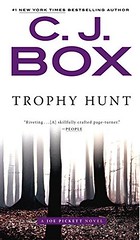 Trophy Hunt (Joe Pickett #4)
Trophy Hunt (Joe Pickett #4)
by C.J. Box
![]()
I’m reading C.J. Box’s Joe Pickett novels, which are set in a mountainous, sparsely-populated corner of Wyoming and feature a fish & game warden who finds himself and his family threatened by bad men intent on raping the West. They’re great reads, engrossing and impossible to put down, and I’m devouring the series.
It’s difficult to write meaningful reviews of individual novels in a series. Unless I have something urgent to say about individual Joe Pickett novels, I’ll repeat what I said about “Open Season,” the first novel in the series:
“As much as I enjoy reading Lee Childs’ Jack Reacher stories, Jack is a superhero, a figure of fantasy. When Jack Reacher gets even, people die … but not before a righteous ass-kicking. While C.J. Box brings on Reacheresque tension and villainy, when it comes to his human and relatable hero Joe Pickett, it’s more a matter of luck. Joe prevails, a believable form of getting even. But don’t worry. Asses do get kicked, in satisfying ways. I really like this Pickett guy. He makes mistakes, and plenty of them. He worries about money. He trusts people he shouldn’t. He’s a regular Joe. I really like the depictions of Wyoming, a state I lived in as a teenager and remember fondly. Joe, at least in this first novel, has an almost-too-perfect family, but there are tensions, and I sense troubled teenage years ahead for his daughter Sheridan. Granted that everything in this novel is fiction, it feels real and true.”
The fourth novel, “Trophy Hunt,” is as taut and gripping as the first three Joe Pickett novels, but like other reviewers, I felt the woo element in this one was out of place. And in addition to the loose ends C.J. Box acknowledged in the final chapters, there were a couple he didn’t mention. But hey, at least there were bears. Well, one anyway.
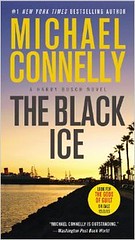 The Black Ice (Harry Bosch #2)
The Black Ice (Harry Bosch #2)
by Michael Connelly
![]()
I’ve been reading the new Harry Bosch/Renee Ballard novels, and of course watching Bosch on Amazon. When the Bosch TV series began to run four years ago I read “The Black Echo,” the original Bosch novel from 1992. Here’s part of what I said then:
“The TV Bosch is surprisingly faithful to Michael Connelly’s literary Bosch. My mental picture of Harry Bosch resembles the actor who plays him on TV. The personalities match. The stories, if I’m not assuming too much from the first novel in the series, generally match. [ … ] These are police procedurals, and though the crimes are complex, Connelly doesn’t make their resolution tricky … Bosch unfolds cases methodically, using old-fashioned shoe leather and diligent detective work, and if there are twists, the reader can see them coming a block or two away. [ … ] In this first novel, Bosch comes across as a bit of a cold fish, a little less sympathetic than his TV counterpart, but I’m assuming his character grows in later novels.”
I’ve now read the second Bosch novel, “The Black Ice,” published in 1993. Some additional observations:
I hadn’t noticed before the absence of contractions in Connelly’s prose and dialog. I’m probably not going to re-read the first novel to verify my observation, but I’ll be looking out for it in future reads and watching the TV adaptation more closely to see if it carries over from the books. What am I talking about? Can not, never can’t. I am, never I’m. Would not, never wouldn’t. Once you notice, the dialog in particular seems stilted, and made me wish Connelly had a little more Elmore Leonard in him … unless it’s intentional, and if it is, I wonder why. Perhaps this is what contributed to my impression of Bosch as a “bit of a cold fish” in the first novel.
I was really disappointed with one of the climactic scenes in “The Black Ice.” The minute the bull, “El Temblar,” was mentioned, I realized Bosch was fated to have a confrontation with it. And I was cool with that, because Chekhov’s gun. What I did not anticipate, and should have seen coming when Bosch visited the bull ring in Mexicali, was that Bosch would wind up playing toreador with the beast and winning on his first try, one of the cheesiest bits of fiction I’ve read in a long time. Shame on you, Mike Connelly. If I wanted Jack Reacher, I’d read Jack Reacher!
Otherwise, what I said in my review of “The Black Echo” applies. I’ll continue to read the Bosch novels as time permits, barring any more spontaneous toreador bullshit. Ole, my ass. A real-life Bosch would have paid with his life, right there and then.
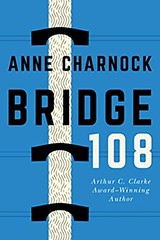 Bridge 108
Bridge 108
by Anne Charnock
![]()
Read something about “Bridge 108,” immediately downloaded it to my Kindle, read it in two sittings. A short, fast, fascinating glimpse of a near future where climate change is driving not only equatorial populations northward, but southern European ones as well, in this case to a still-livable (though sultry) and seemingly prospering England.
The story is told from differing viewpoints, all in the first person as events unfold, with almost no exposition on how society and the economy is organized, or exactly what is happening in the world to drive populations north. We learn about fires and drought, failed economies, and worldwide desperation through the incidental recollections of individual characters, notably those of Caleb, the young boy who is more or less the protagonist of the tale. It takes skill to build worlds this way, and Anne Charnock succeeds.
I was struck by the theme of social and economic inequality in the novel’s England, depicted starkly in the contrast between the barebones enclaves where unchipped workers are housed, nominally under government control but in fact ruled by criminal clans, and the posh country suburbs where educated and chipped managers and professional classes live.
We learn that all English children are inoculated against addictive behavior (substance abuse, alcoholism) and that those citizens who can pass intelligence tests are chipped to further enhance their intelligence. A separate class of “stimulants,” human but almost cyborg-like, lacking emotion and empathy, are the logicians of the new society.
Then there are the desperate immigrants … mostly adults, so the childhood inoculations native English citizens get generally don’t “take”; a troublesome population, unassimilateable and unchipped, if not immediately returned to the countries they escaped from allowed to perform indentured labor for set periods of time; upon completion, if lucky, allowed to become laborers in the enclaves … much more likely, though, to be repatriated anyway after serving their time: the immigrants’ experience at best only slightly less hellish than the lives they fled. If “Bridge 108” doesn’t make you think about how today’s societies treat economic and political immigrants (and how we’ll soon be treating climate immigrants), you might just be a stimulant yourself.
Thought-provoking and well told. My only wish is that it was longer!
 The Things They Carried
The Things They Carried
by Tim O’Brien
![]()
Did not finish; no rating.
From booklady’s Goodreads review:
“While I wasn’t looking for Sunday school platitudes from a book about Vietnam, I was looking for some reason, some sense which he could bring to bear after twenty years of writing and reflecting on his experiences there. Instead what I found was a collection of disjointed stories full of nihilism, gore, G.I. trashy talk, suffering and torture.”
Which is more or less how I felt, halfway through. I’ll add that it’s windy and repetitious, but that wouldn’t bother me if there were some moral underpinning to the author’s reflections on war.
I started reading “The Things They Carried” to learn why book-banning MAGA types on the Palmer and Wasilla, Alaska school board are trying to remove it from the curriculum and school libraries, along with four other prize-winning (and widely taught) novels: Maya Angelou’s “I Know Why the Caged Bird Sings”, Ralph Ellison’s “Invisible Man”, Joseph Heller’s “Catch-22”, and F. Scott Fitzgerald’s “The Great Gatsby.” I thought it might be sex, but I think now they hate it for the same nihilism I and other reviewers have noted, coupled with the general right-wing hatred for any war novel that doesn’t glorify American GIs and our noble motives in killing brown and black people. “The Things They Carried” is the kind of book they would perceive as one forced down childrens’ throats by the libs.
I was too dispirited by the first half of the memoir to continue. The writing, apart from the long-windedness and repetitiveness I mentioned, is good, but the message … if there is one … is too abstract to grasp, and overall the book left me cold.
Funny about your reaction to the Tim O’Brien book. I never finished his first book and never went back for another look. I did just finish Leonard’s “Djibouti ” which was lots of fun. And these days I’m bingeing my way through John Harvey’s Charlie Resnick series. Harvey, a writer Greg and I knew in Nottingham, is a meticulous writer with interestingly complex plots and passages that are downright lyrical balanced against the toughness of Britain’s Midlands cities. And then there’s Resnick’s passion for jazz, about which Harvey is very knowledgeable. Very nice work.
Thanks for the tip, Robin. I downloaded Cold in Hand (Resnick #11) to my Kindle just now. Was going to look for #1 but the Goodreads reviews were very mixed, so thought I’d try one of the later ones.